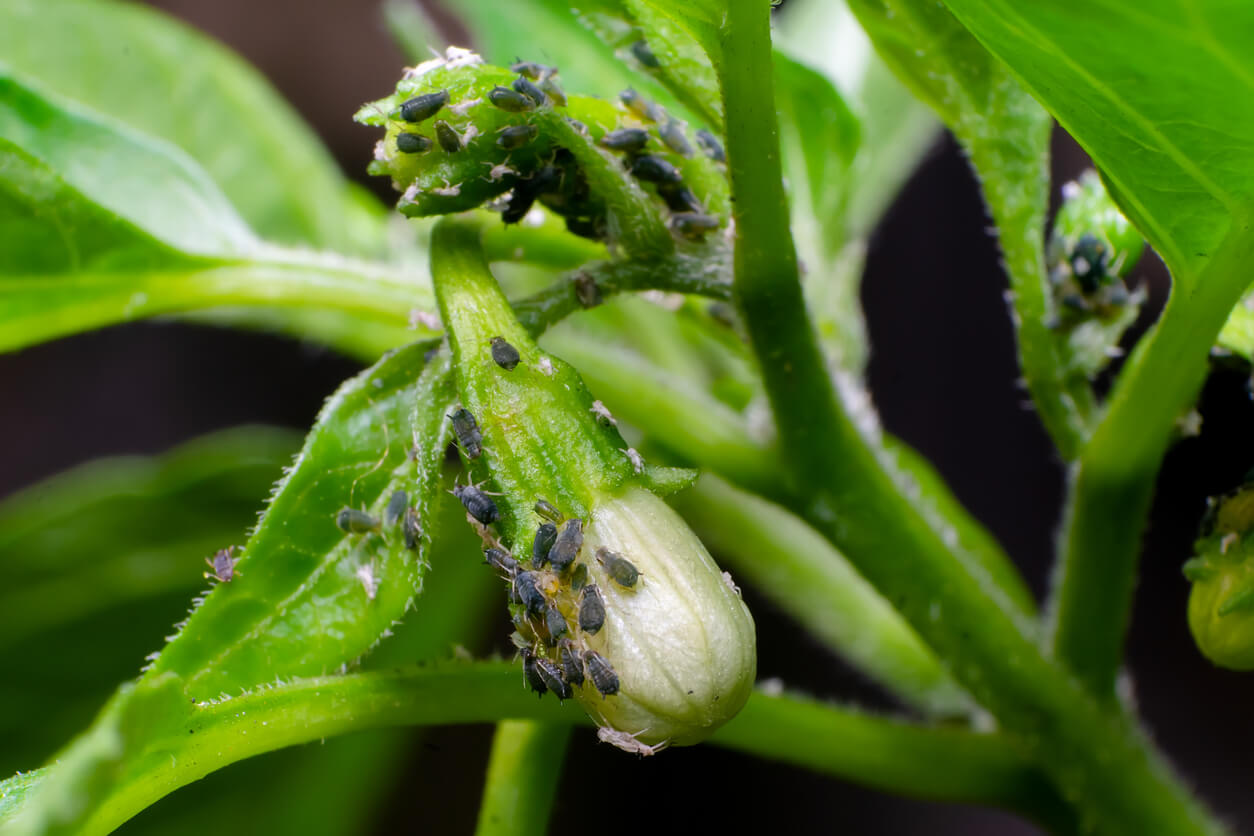
Aphids on a chile plant
Pests on your hot peppers, left unchecked, can damage and destroy your developing plants. Keeping a close watch on your plants during regular daily inspections will help you spot any pests before they can do irreparable harm. Healthy hot peppers can bounce back from pest damage if you catch the pests quickly.
A couple notes about prevention:
- Don’t overwater.
- Use floating row covers when plants are young.
- Place sticky traps to catch pests early.
- Set up fencing to deter grazing animals, such as deer and rabbits.
- Sprinkle diatomaceous earth to deter slugs and snails.
Spot the Symptoms of Pepper Plant Pests
Check hot pepper leaves, stems, fruits, and flowers for these symptoms that come from pests on the prowl.
| Symptom | Pest |
|---|---|
| Yellowing leaves; clusters of small “bumps” on leaves; “honeydew” on stems with sooty mold growing on it | Aphids |
| Damaged or destroyed leaves; scars on fruit | Beet armyworm; Tobacco cornworm |
| Holes in leaves, buds, and sometimes young fruit | Flea beetle; Pepper weevil; Plant bug; Slugs; Snails |
| Leaves crinkle, curl, and turn yellow | Potato leafhopper |
| Holes in peppers | Corn earworm; Fall armyworm; Pepper maggot |
| Stems cut off at soil level | Cutworms |
| Round holes chewed into stems | Corn borer |
| Curved cut in fruit | Plum curculio |
| Webs on leaves; damage to underside of leaves; white or yellow spots on leaves; leaf drop | Mites |
| Extensive leaf damage leading to sunscald of peppers | Tomato hornworm |
How to Treat Pests on Hot Peppers
Here are some proven ways to get rid of pests on your hot peppers. Choose the best treatment for the type of pests invading your plants.
- Pick off the pests. Use your garden gloves to remove the pests by hand. After removal, destroy pests by drowning them in a bucket of soapy water or crushing them with your foot. Handpicking isn’t efficient or practical for very small pests but works well with larger pests.
- Blast them. If you spot invaders like aphids, give them a good blast with the garden hose. Chances are good the neighborhood birds will notice and come eat your pests.
- Trap them. If slugs or snails are trying to munch on your hot pepper plants, divert their attention with the time-tested beer trap. Dig a shallow hole and put a small bowl of beer in it near your peppers. Check the trap each day; chances are you’ll find some treats to pass along to the neighborhood birds.
- Block them. Is someone nibbling on your plants? Could be deer or rabbits. If that’s the case, set up some invisible mesh fencing between 3 to 12 inches high to keep rabbits out; just be sure to secure it well to the ground so they don’t just burrow underneath. For deer, strategically placed wire or string at heights of 6, 12, and 24 inches should do the trick.
- Repel them. Ask a local salon for some hair clippings. Tie the clippings up in panty hose and distribute these little sachets around the garden. Nibbling animals don’t like the smell of human hair. Another thing they don’t like is fragrant soap. Tie some pieces of strong soap in a panty hose packet and hang the packets from the stakes or cages around your plants.
- Apply insecticidal soap. Insecticidal soap is organic. The potassium salts in insecticidal soap help remove an insect’s protective waxes, causing destruction of insect membranes and killing them. Mix the soap with water to create your solution and apply directly to insects on any plants. While insecticidal soap is less apt to affect other organisms, certain plants might be sensitive to the soap and can suffer leaf burn.
- Apply horticultural oils. Combine plant- or petroleum-based oils with water to produce horticultural sprays. Neem oil, for instance, is derived from seed extracts of the neem plant. Oil-based sprays block an insect’s air holes, interfere with an insect’s metabolism, disrupt insect feeding, and inhibit insect growth. Like insecticidal soaps, horticultural oils can cause plant injury if not properly diluted.
- Make your own pest spray. You can make your own pest spray with benign materials. Mix 1 tablespoon of baking soda, 1/2 teaspoon of a mild dish detergent, and 2 1/2 tablespoons of olive oil in a gallon of water to make a solution that will repel all kinds of bugs, as well as a fungicide for blight and mildew on pepper plant leaves. Shake it well in your bottle before spraying and repeat every week for it to be continuously effective.
- Diatomaceous Earth (DE). Sprinkle DE at the base of plants and between plants. Many pests cannot cross over this barrier without dying.
Do pests attack your hot peppers every year? How do you handle removing them—and even preventing them in the first place? Please tell us how you treat your hot peppers to avoid pests.


 Previous
Previous

